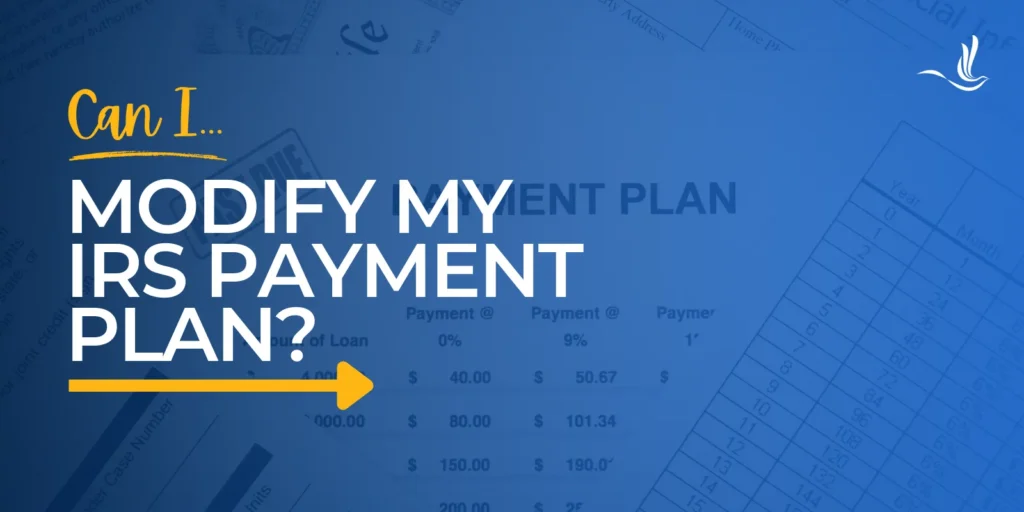When faced with tax debt, an IRS payment plan, also known as an installment agreement, offers a lifeline. It allows taxpayers to pay off their debt in smaller, more manageable amounts over time. But what if your financial circumstances change? Can you modify an IRS payment plan, and if so, how? The answer is yes. The IRS provides the flexibility to adjust your payment plan under certain conditions. In this article, we’ll explore how modifications work, reasons to modify, eligibility criteria, and practical tips to help you through the process.
Reasons to Modify an IRS Payment Plan
Life circumstances can change unexpectedly, impacting your ability to meet your current IRS payment terms. Some common reasons why you might want to modify your IRS installment agreement include:
- Loss of Income or Employment: A job loss, reduced hours, or decreased earnings can make it difficult to stick to your original payment plan.
- Unexpected Expenses: Medical emergencies, car repairs, or home maintenance can put a strain on your finances.
- Change in Family Size: The addition of a child or other dependents can impact your ability to pay.
- Increase in Other Debts: Accumulating credit card debt or facing other financial obligations may prompt you to seek a change in your payment plan.
These are just a few examples. Essentially, any change in financial circumstances that affects your ability to pay your agreed monthly amount could justify requesting a modification.
Types of IRS Payment Plan Modifications
If you’re considering modifying your IRS payment plan, you have a few options depending on your financial situation. Here are the common types of modifications you can request.
- Lowering Your Monthly Payment: If your current payments are unmanageable, you can request to lower the monthly amount to something more affordable. This option is useful for those whose income has decreased or who have unexpected expenses.
- Changing Your Payment Due Date: You may find that the due date you initially agreed on no longer aligns with your pay schedule. For instance, if you get paid biweekly or at a different time of the month, adjusting the due date might make budgeting easier.
- Extending the Payment Period: When lowering the payment isn’t enough, you may be eligible to extend the duration of your plan. This option, however, means you’ll pay for a longer period and potentially accumulate more interest and penalties.
- Switching to a Partial Payment Installment Agreement: If your financial situation has severely deteriorated, you might qualify for a Partial Payment Installment Agreement (PPIA). With this option, you pay a reduced monthly amount based on your financial condition, but the plan may extend beyond the typical timeframe.
- Requesting a Temporary Hardship Suspension: In extreme cases, you can request a temporary suspension of your payments. However, interest and penalties will continue to accrue during the suspension period, and you’ll be required to renegotiate payments later.
Are You Eligible for a Modification?
To qualify for a modification of your IRS payment plan, certain criteria must be met.
- Timely History of Payments: If you’ve been making consistent, on-time payments, the IRS is more likely to approve a modification.
- Demonstrated Change in Financial Circumstances: You must provide evidence of a significant change in your finances, such as reduced income or increased expenses.
- Current in Filing Requirements: You must be up to date on your tax filings. Failure to file your taxes may result in the IRS denying your request for a modification.
- Willingness to Cooperate: Cooperating with the IRS during the review process is crucial. This includes providing requested documentation promptly and being open to alternative terms.
How to Request a Modification
Modifying your IRS payment plan requires a proactive approach and a clear understanding of the process.
Evaluate Your Financial Situation
Before contacting the IRS, assess your current financial circumstances. Create a detailed budget, taking into account your income, expenses, and debt obligations. This will help you determine the changes you need to request.
Gather Documentation
The IRS may ask for documentation to support your modification request. Be prepared to provide financial statements, pay stubs, medical bills, or other proof of your changed circumstances.
Contact the IRS
You can request a modification by calling the IRS at the number listed on your payment plan agreement notice or by visiting a local IRS office. Keep in mind that contacting the IRS early in your financial difficulties increases your chances of approval.
Submit Form 9465 (if needed)
If you are requesting a change in your installment agreement or setting up a new plan, you may need to submit Form 9465, Installment Agreement Request. For lower-income taxpayers, certain fees can be waived.
Be Ready to Negotiate
During the review process, the IRS may propose alternative terms based on your financial capacity. It’s essential to be honest about your situation and prepared to discuss your income, expenses, and other factors.
Follow Up
After submitting your request, make sure to follow up with the IRS. They may require additional information or documentation. Stay on top of deadlines and respond promptly to avoid delays.
What Happens If You Default?
If you fail to make your scheduled payments without requesting a modification, the IRS considers your plan in default. This can lead to serious consequences.
- Immediate Collection Actions: The IRS may initiate wage garnishments, bank levies, or other collection actions to recover the debt.
- Revocation of the Payment Plan: Once revoked, it’s more challenging to negotiate a new payment plan.
- Additional Penalties and Interest: Defaulting on your plan can lead to higher penalties and accumulating interest.
If you suspect you won’t be able to make an upcoming payment, contact the IRS as soon as possible to discuss your options.
Tax Help for Those With IRS Installment Agreements
Modifying an IRS payment plan is not only possible but often necessary when your financial situation changes. The IRS recognizes that life happens, and they offer flexible options to help you stay on track with your tax obligations. If you find yourself struggling to meet your current payment plan, take action early. Evaluate your financial situation, gather necessary documents, and communicate proactively with the IRS. Doing so can help you avoid default, prevent unnecessary stress, and keep you in good standing with the IRS. Optima Tax Relief has over a decade of experience helping taxpayers get back on track with their tax debt.
If You Need Tax Help, Contact Us Today for a Free Consultation
Publisher: Source link











